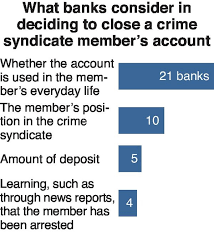At least 59 of 120 banks nationwide are in the process of canceling accounts that antisocial forces, including organized crime syndicates, opened before the introduction of provisions aimed at eliminating transactions involving gang groups,
About 1,300 contracts were canceled by the end of May. In July last year, the Supreme Court finalized the Fukuoka High Court’s ruling, which validates the cancellation of bank accounts based on the provisions. That likely provided impetus for the banks’ latest moves.
The survey was conducted from June to July on 119 full members of the Japanese Bankers Association and its sub-associate member Japan Post Bank, with 84 banks sending valid responses. These banks had implemented the provisions by August 2015 and in principle do not comply with requests to open new accounts for gang members.
Of the 84 banks, 59, or about 70 percent, were found to have been in the process of canceling accounts that were established before the provisions were implemented. Asked why, a major commercial bank and others answered “in response to the requests of society,” while a regional bank in the Shikoku region said it “may become a target of unlawful demands and also violate an ordinance.”
Regarding issues that would be taken into consideration, 21 banks said they would lower the cancellation priority for accounts used for daily life, such as making utilities payments. Ten banks said they preferentially canceled accounts of people who were in the top positions in the organization.
There were still about 4,300 accounts belonging to antisocial forces in at least 10 banks. One bank in the Tohoku region said it had kept accounts open because “employees’ safety has not been fully ensured.”
■ Provisions aimed at eliminating transactions involving gang groups
Includes a clause about not forming contracts with antisocial forces, such as organized crime syndicates. Entities can cancel a deal with gang members if they are found to have hidden their occupation. The government presented a guideline in June 2007, and the provisions have been adopted by various types of businesses, including real estate firms, rent-a-car companies and hotels.Speech




